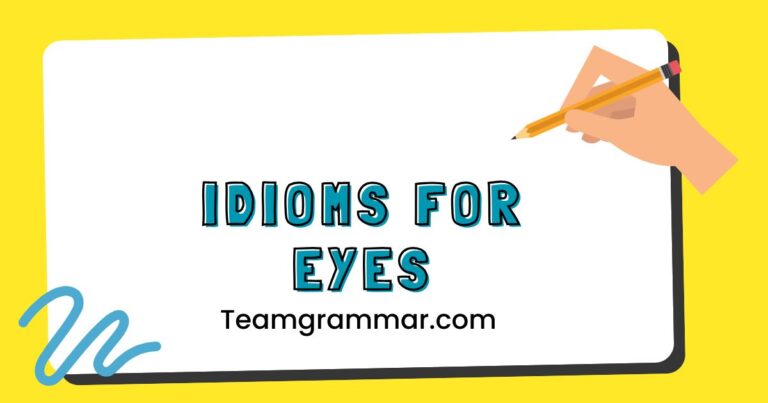33 Idioms for Night: Mastering Night-Related Expressions
Idioms are essential for understanding and using English fluently. They add color and depth to our language, allowing us to express complex ideas in concise and evocative ways.
Mastering idioms related to ‘night’ can significantly enhance your comprehension and communication skills, enabling you to grasp nuances and cultural references that might otherwise be missed. This article provides a comprehensive guide to common idioms about night, suitable for English learners of all levels, from beginners to advanced speakers.
By exploring their meanings, origins, and usage, you’ll gain a richer understanding of the English language and its expressive power.
Table of Contents
- Introduction
- Definition of Idioms
- Structural Breakdown of Idioms
- Types and Categories of Night Idioms
- Examples of Night Idioms
- Usage Rules for Night Idioms
- Common Mistakes with Night Idioms
- Practice Exercises
- Advanced Topics in Night Idioms
- Frequently Asked Questions
- Conclusion
Definition of Idioms
Anidiomis a phrase or expression whose meaning cannot be understood from the ordinary meanings of the words it contains. In other words, it’s an expression where the overall meaning is different from the literal meaning of the individual words.
Idioms are a crucial part of any language, adding richness and color to everyday communication. They often reflect cultural values, historical events, or common experiences.
Understanding idioms is essential for achieving fluency and comprehending the nuances of the English language.
Idioms can be classified based on their function: some act as verbs (e.g.,hit the hay), others as nouns (e.g.,night owl), and yet others as adjectives or adverbs. Their function depends on how they are used within a sentence.
The context in which an idiom is used is critical, as the same idiom can have slightly different meanings depending on the situation. For example, the idiom ‘burn the midnight oil’ typically refers to studying or working late into the night, but it can also imply a general state of being overworked or dedicated to a task.
Structural Breakdown of Idioms
Idioms don’t follow standard grammatical rules in terms of meaning. Their structure can vary widely.
Some idioms are simple phrases, while others are complex sentences. The key characteristic is that the meaning isn’t derived from the literal interpretation of the words.
Instead, the phrase as a whole conveys a specific, often figurative, meaning.
For example, consider the idiom “night and day.” Structurally, it’s a simple conjunction of two nouns. However, its meaning – constantly or continuously – has nothing to do with the literal meaning of “night” and “day.” Understanding the structure of an idiom can sometimes provide clues to its meaning, but more often than not, memorization and exposure are required.
Many idioms have historical roots, meaning their structures reflect older grammatical forms or cultural references that are no longer in common usage. Recognizing these historical elements can sometimes aid in understanding the idiom’s origin and intended meaning.
Types and Categories of Night Idioms
Idioms related to ‘night’ can be categorized based on the specific aspect of nighttime they represent. Here are some common categories:
- Idioms related to sleep: These idioms describe going to bed, sleeping well, or having trouble sleeping.
- Idioms related to late hours: These idioms describe staying up late or working until late at night.
- Idioms related to darkness: These idioms describe secrecy, mystery, or hidden activities.
- Idioms related to nighttime activities: These describe activities that typically occur at night, such as parties or crime.
- Idioms related to peace and tranquility: These idioms describe the calmness and quietness often associated with night.
Examples of Night Idioms
Here are several examples of idioms related to night, categorized for clarity. Each category includes a table with examples, their meanings, and example sentences to illustrate their usage.
Idioms Related to an Early Night
These idioms are used to describe going to bed or finishing activities earlier than usual. They often suggest a desire for rest or a need to be refreshed.
The following table includes examples of idioms related to an early night, their meanings, and example sentences.
| Idiom | Meaning | Example Sentence |
|---|---|---|
| Call it a night | To stop doing something for the rest of the evening or night | “It’s getting late, let’s call it a night and finish this tomorrow.” |
| Hit the hay | To go to bed | “I’m exhausted, I’m going to hit the hay.” |
| Hit the sack | To go to bed (similar to ‘hit the hay’) | “After such a long day, I just want to hit the sack.” |
| Turn in | To go to bed | “I think I’ll turn in early tonight, I’m feeling tired.” |
| Retire for the night | To go to bed (formal) | “After a lovely evening, we decided to retire for the night.” |
| Get some shut-eye | To get some sleep | “I need to get some shut-eye before the big meeting tomorrow.” |
| Catch some Z’s | To sleep | “I’m going to catch some Z’s; wake me up in a few hours.” |
| Go night-night | A childish way of saying goodnight and going to bed | “Time for you to go night-night, little one.” |
| Off to dreamland | Going to sleep | “I’m off to dreamland, see you in the morning!” |
| Lights out | Time to go to sleep, often used in a military or institutional setting | “It’s 10 PM, lights out!” |
| Early to bed, early to rise | Going to bed early and waking up early is beneficial | “I always follow the saying, early to bed, early to rise, it helps me be productive.” |
| Nestle down for the night | To get comfortable and prepare to sleep | “After a warm bath, I nestled down for the night with a good book.” |
| Be in the land of nod | To be asleep | “He’s already in the land of nod; don’t make too much noise.” |
| Get forty winks | To take a short nap | “I’m going to get forty winks before we head out.” |
| Take a siesta | To take an afternoon nap (often used in warmer climates) | “It’s so hot; I think I’ll take a siesta.” |
| Sleep on it | To postpone a decision until the next day after sleeping on it | “Don’t make a rash decision, sleep on it and tell me tomorrow.” |
| Get a head start on sleep | To go to bed earlier than usual to get more sleep | “I’m going to get a head start on sleep tonight because I have a busy day tomorrow.” |
| Under the covers | To be in bed, ready to sleep | “I’m already under the covers, ready for a good night’s sleep.” |
| Off to Bedfordshire | To go to bed (British English) | “I’m feeling quite tired, so I’m off to Bedfordshire.” |
| Tuck in | To make someone comfortable in bed, often a child | “I’ll tuck the kids in before I go to bed myself.” |
| Turn down the covers | To prepare a bed for someone to sleep in | “She kindly turned down the covers for me in the guest room.” |
| Drift off to sleep | To gradually fall asleep | “I love to drift off to sleep while listening to music.” |
| Sawing logs | To snore loudly while sleeping | “My husband is sawing logs again tonight!” |
Idioms Related to a Late Night
These idioms describe staying up late, often working or engaging in activities that extend into the late hours of the night.
The following table includes examples of idioms related to a late night, their meanings, and example sentences.
| Idiom | Meaning | Example Sentence |
|---|---|---|
| Burn the midnight oil | To work or study late into the night | “I had to burn the midnight oil to finish the project on time.” |
| Up all night | To stay awake the entire night | “I was up all night studying for the exam.” |
| All-nighter | A night spent awake, usually for work or study | “Pulling an all-nighter is never fun, but sometimes it’s necessary.” |
| Stay up until the wee hours | To stay up very late at night | “We stayed up until the wee hours chatting and laughing.” |
| Keep late hours | To regularly stay up late | “Doctors often keep late hours due to their demanding schedules.” |
| Midnight feast | Eating a meal late at night | “The kids had a secret midnight feast while their parents were asleep.” |
| Night owl | A person who stays up late and is active at night | “I’m a night owl; I do my best work after midnight.” |
| The witching hour | Midnight; a time associated with supernatural events | “Strange things always seem to happen around the witching hour.” |
| Stay out till all hours | To stay out very late | “My parents get worried when I stay out till all hours.” |
| Rock around the clock | To party or celebrate all night long | “They decided to rock around the clock to celebrate their anniversary.” |
| Paint the town red | To go out and celebrate in a lively manner | “Let’s paint the town red tonight to celebrate our victory!” |
| Burn the candle at both ends | To work very hard, often leading to exhaustion | “He’s been burning the candle at both ends trying to finish the project.” |
| Stay out on the tiles | To go out drinking and partying (British English) | “He stayed out on the tiles last night and is feeling rough today.” |
| Midnight oil | Refers to working or studying late into the night | “The student was fueled by midnight oil during finals week.” |
| Moonlighting | Having a second job, often at night, in addition to a regular job | “He’s moonlighting as a security guard to earn extra money.” |
| Nightcap | An alcoholic drink taken before going to bed | “He enjoys a nightcap of whiskey before bed.” |
| Graveyard shift | A work shift that takes place during the night or early morning hours | “She works the graveyard shift at the hospital.” |
| After-hours | Occurring or done after the usual working or business hours | “They had an after-hours meeting to discuss the urgent matter.” |
| Night watch | The act of guarding or watching something at night | “The security guard was on night watch at the museum.” |
| Night train | A train that runs overnight | “They took the night train to reach their destination early.” |
| Night bus | A bus that runs overnight | “I took the night bus back home after the concert.” |
| Night market | A market that operates at night | “The night market is a great place to find street food.” |
| Night flight | A flight that takes place at night | “The night flight was smooth and comfortable.” |
Idioms Related to Nighttime Activities
These idioms describe activities that typically occur at night, often involving socializing, entertainment, or sometimes illicit behavior.
The following table includes examples of idioms related to nighttime activities, their meanings, and example sentences.
| Idiom | Meaning | Example Sentence |
|---|---|---|
| Night on the town | An evening spent enjoying entertainment and socializing | “We had a night on the town to celebrate his birthday.” |
| In the dead of night | In the middle of the night, when it is very quiet and dark | “The thief broke into the house in the dead of night.” |
| Things that go bump in the night | Strange or frightening noises heard at night | “Don’t worry about things that go bump in the night; it’s just the wind.” |
| Night games | Activities or plans done secretly or under the cover of night | “They were playing night games with the company’s finances.” |
| Night moves | Secret or underhanded actions, often romantic or illicit | “He was making night moves to win her over.” |
| Night vision | The ability to see in low light conditions | “The soldiers used night vision goggles to navigate the dark terrain.” |
| Night terrors | Episodes of intense fear, screaming, and activity during sleep | “The child suffered from night terrors after watching the scary movie.” |
| Night sweats | Excessive sweating during sleep | “He woke up drenched in night sweats due to his fever.” |
| Silent night | A peaceful and quiet night | “We wish you a silent night and a joyful Christmas.” |
| Open all night | A business or service that operates throughout the night | “The diner is open all night, so we can grab a late-night snack.” |
| The night is young | There is still plenty of time left in the evening | “Don’t worry; the night is young, and we have lots of time to have fun.” |
| A dark night of the soul | A period of spiritual crisis or despair | “He went through a dark night of the soul after losing his job.” |
| Wolf in the night | A threat or danger that is hidden or disguised | “Be careful of the wolf in the night; not everyone is who they seem.” |
| City that never sleeps | A city with vibrant nightlife and activity at all hours | “New York is known as the city that never sleeps.” |
| Night crawler | A person who is active at night, often in a suspicious or criminal way | “The police are on the lookout for night crawlers in the neighborhood.” |
| Night blooming cereus | A flower that blooms only at night | “The garden featured a rare night blooming cereus.” |
| Nightshade | A type of plant, some species of which are poisonous | “Be careful not to touch the nightshade; it’s poisonous.” |
| Nightjar | A nocturnal bird | “The nightjar‘s song echoed through the forest.” |
| Night-line | A confidential telephone service that operates at night | “She called the night-line for support during a difficult time.” |
| Good night’s sleep | A restful and uninterrupted sleep | “I hope you have a good night’s sleep.” |
| Sleepless night | A night spent without sleep | “He had a sleepless night worrying about the upcoming presentation.” |
| Night blindness | Difficulty seeing in low light or at night | “People with night blindness have trouble driving at night.” |
Idioms Related to Darkness and Secrecy
These idioms use the concept of night and darkness to convey ideas of secrecy, hidden activities, or things that are not easily seen or understood.
The following table includes examples of idioms related to darkness and secrecy, their meanings, and example sentences.
| Idiom | Meaning | Example Sentence |
|---|---|---|
| In the dark | Uninformed; unaware of something | “They kept me in the dark about their plans.” |
| Dark horse | A competitor who is unexpectedly successful | “He was a dark horse in the election, but he won.” |
| Black as night | Extremely dark | “The sky was black as night during the storm.” |
| Cloud hangs over | A feeling of unease or sorrow | “A cloud hangs over the town after the tragedy.” |
| A shot in the dark | A guess or attempt that is unlikely to succeed | “Applying for that job was just a shot in the dark.” |
| Cloak-and-dagger | Involving secrecy and intrigue | “The spy movie was full of cloak-and-dagger action.” |
| Secrets of the night | Hidden or unknown information | “The old house held many secrets of the night.” |
| Darkest before dawn | The most difficult time is just before improvement or success | “Remember, it’s always darkest before dawn, so don’t give up.” |
| Cast a shadow | To cause a feeling of sadness or doubt | “The scandal cast a shadow over his reputation.” |
| Under the cover of darkness | Secretly, at night | “They escaped under the cover of darkness.” |
| Whistle in the dark | To try to stay cheerful in a frightening situation | “He was just whistling in the dark; he was actually very scared.” |
| Black market | An illegal market where goods are sold unlawfully | “They were involved in the black market trade of stolen goods.” |
| Dark matter | An invisible substance that makes up most of the universe’s mass | “Scientists are still trying to understand dark matter.” |
Idioms Related to Peace and Tranquility of Night
These idioms capture the sense of calm, quiet, and serenity often associated with the night, a time for rest and reflection.
The following table includes examples of idioms related to the peace and tranquility of night, their meanings, and example sentences.
| Idiom | Meaning | Example Sentence |
|---|---|---|
| Still of the night | The quietest part of the night | “I love the still of the night when everything is peaceful.” |
| Peaceful night | A night free from disturbances or worries | “We had a peaceful night after a long day of travel.” |
| Quiet night | A night with little or no noise | “It was a quiet night in the countryside.” |
| Serene night | A calm and tranquil night | “The serene night was perfect for stargazing.” |
| Sleep like a log | To sleep very soundly | “I was so tired that I slept like a log.” |
| Restful night | A night of good, restorative sleep | “After the massage, I had a very restful night.” |
| Lullaby | A soothing song sung to children to help them sleep | “The mother sang a lullaby to her baby.” |
| Dreamland | A state of sleep or a place of dreams | “He was fast asleep, lost in dreamland.” |
Usage Rules for Night Idioms
When using night idioms, it’s important to consider the context and audience. Some idioms are formal, while others are informal.
Using an informal idiom in a formal setting could be inappropriate. Additionally, be mindful of cultural differences.
Some idioms may be more common in certain regions or dialects of English than others.
Rule 1: Understand the meaning: Before using an idiom, ensure you fully understand its meaning. Using an idiom incorrectly can lead to confusion or miscommunication.
Rule 2: Consider the context: Idioms are context-dependent. An idiom that is appropriate in one situation may not be suitable in another.
Rule 3: Know your audience: Some idioms are more common in certain regions or age groups. Consider your audience when choosing an idiom.
Rule 4: Avoid overuse: While idioms can add color to your language, overuse can make your speech sound unnatural or forced.
Rule 5: Be aware of literal vs. figurative meaning: Remember that idioms have a figurative meaning that is different from the literal meaning of the words.
Common Mistakes with Night Idioms
One common mistake is misinterpreting the meaning of an idiom due to its literal interpretation. For example, someone might misunderstand “burn the midnight oil” to mean setting something on fire rather than working late.
Another mistake is using an idiom in an inappropriate context, such as using a casual idiom in a formal speech. Finally, some learners create “new” idioms by mixing up parts of existing ones, leading to nonsensical phrases.
Here are some examples of common mistakes and their corrections:
| Incorrect | Correct | Explanation |
|---|---|---|
| “I will burn the oil of midnight to finish my work.” | “I will burn the midnight oil to finish my work.” | The words in the idiom must be in the correct order. |
| “Let’s call it a day at night.” | “Let’s call it a night.” | The correct idiom is “call it a night,” not “call it a day at night.” |
| “He was up all the night.” | “He was up all night.” | The correct idiom is “up all night,” without the article “the.” |
| “I’m going to hit the bed of hay.” | “I’m going to hit the hay.” | The idiom is “hit the hay,” not “hit the bed of hay.” |
Practice Exercises
Test your understanding of night idioms with these exercises. Fill in the blanks with the appropriate idiom from the list provided.
Idiom List:
- Burn the midnight oil
- Call it a night
- Hit the hay
- In the dark
- Night owl
- Night on the town
- In the dead of night
- Slept like a log
- The night is young
- Dark horse
| Question | Answer |
|---|---|
| 1. After working until 2 AM, I finally decided to _____. | Call it a night |
| 2. She’s a true _____; she does her best work after everyone else is asleep. | Night owl |
| 3. I have a big exam tomorrow, so I need to _____. | Burn the midnight oil |
| 4. We went out for a _____ to celebrate our anniversary. | Night on the town |
| 5. I was so tired that I _____. | Slept like a log |
| 6. They kept me _____ about their secret plans. | In the dark |
| 7. He was a _____ in the race, but he ended up winning. | Dark horse |
| 8. It’s only 10 PM, _____, we still have plenty of time to have fun. | The night is young |
| 9. The thief broke into the museum _____. | In the dead of night |
| 10. I’m exhausted; I’m going to _____. | Hit the hay |
Exercise 2: Choose the correct idiom to complete the sentence.
| Question | Answer |
|---|---|
| 1. After a long day, I just want to _____. (a) burn the midnight oil (b) hit the hay (c) paint the town red | (b) hit the hay |
| 2. The project is due tomorrow, so I have to _____. (a) call it a night (b) hit the sack (c) burn the midnight oil | (c) burn the midnight oil |
| 3. Let’s _____ and go dancing! (a) call it a night (b) paint the town red (c) hit the hay | (b) paint the town red |
| 4. She’s a _____ and prefers to work at night. (a) night owl (b) early bird (c) lark | (a) night owl |
| 5. They snuck out _____. (a) in broad daylight (b) under the cover of darkness (c) during the day | (b) under the cover of darkness |
| 6. I _____ after such a tiring day. (a) slept like a baby (b) slept like a log (c) slept lightly | (b) slept like a log |
| 7. Don’t tell anyone; keep it _____. (a) in the dark (b) in the light (c) in plain sight | (a) in the dark |
| 8. The suspect vanished _____. (a) in the morning (b) in the dead of night (c) at noon | (b) in the dead of night |
| 9. We decided to _____ after a productive meeting. (a) hit the hay (b) call it a night (c) burn the midnight oil | (b) call it a night |
| 10. He was a _____ in the competition. (a) clear favorite (b) dark horse (c) front runner | (b) dark horse |
Advanced Topics in Night Idioms
For advanced learners, exploring the etymology and historical context of night idioms can provide deeper insights. Many idioms have their roots in historical events, cultural practices, or literary works.
Understanding these origins can enhance your appreciation of the English language and its evolution. For example, the phrase “burn the midnight oil” likely originated from a time when oil lamps were used for lighting, and burning them late into the night signified dedicated work or study.
Another advanced topic is the use of night idioms in literature and creative writing. Authors often use idioms to add depth, color, and authenticity to their writing.
Analyzing how idioms are used in different literary genres can improve your understanding of their nuances and impact. Furthermore, exploring regional variations in night idioms can broaden your linguistic repertoire.
Some idioms may be more common in British English, while others are more prevalent in American English. Learning these variations can help you communicate more effectively in diverse contexts.
Frequently Asked Questions
Here are some frequently asked questions about idioms related to night.
- What is an idiom?
An idiom is a phrase or expression whose meaning cannot be understood from the ordinary meanings of the words it contains. It’s a figurative expression where the overall meaning is different from the literal meaning of the individual words.
- Why are idioms important to learn?
Idioms are important because they are a common part of everyday language. Understanding them helps you comprehend spoken and written English more effectively. Using idioms correctly can also make your communication more natural and expressive.
- How can I learn idioms effectively?
The best way to learn idioms is through exposure and practice. Read books, watch movies, listen to podcasts, and pay attention to how native speakers use idioms in conversation. Make a note of new idioms and try to use them in your own speech and writing.
- Are idioms the same in all English-speaking countries?
No, idioms can vary between different English-speaking countries and regions. Some idioms are more common in British English, while others are more prevalent in American English or Australian English. Be aware of these regional variations when learning and using idioms.
- Can I create my own idioms?
While it’s possible to create new expressions, they won’t be considered true idioms unless they become widely accepted and used by native speakers. Idioms typically evolve over time and become ingrained in the language.
- How do I know when to use an idiom?
Use idioms when they fit naturally into the context of your communication. Avoid forcing idioms into situations where they don’t belong. Consider your audience and the formality of the setting when choosing an idiom.
Conclusion
Mastering idioms related to ‘night’ can significantly enhance your English language skills. By understanding the meanings, origins, and usage of these expressions, you can communicate more effectively and appreciate the richness of the English language.
Continue to practice using these idioms in various contexts to solidify your understanding and fluency. Whether you’re aiming to improve your conversational skills, excel in academic settings, or simply enjoy a deeper connection with English-speaking culture, a solid grasp of night idioms is a valuable asset.







